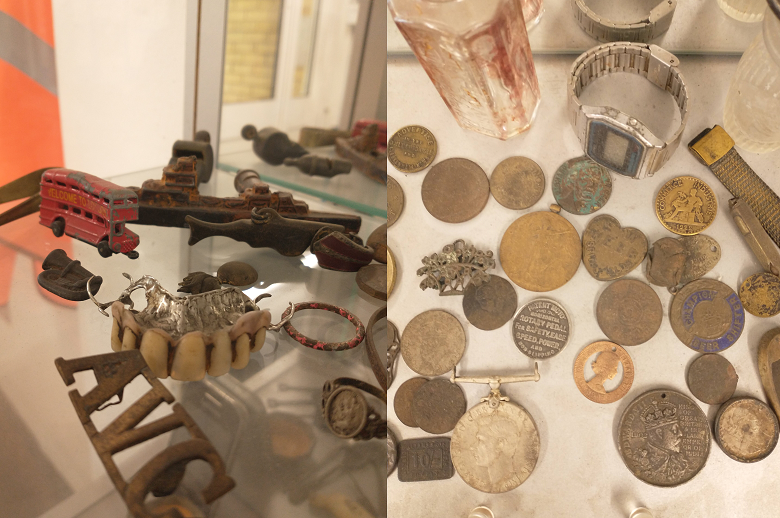Flushed Frights: Plumbing Nightmares

Dentures, money, a watch and a red toy bus. Some of the weird items that have been found in Thames Water's sewers and sewage treatment plants.
Dentures, Watches, Jewellery, Money and more! This Halloween, Thames Water is reminding customers to be careful with what they flush down the loo by showcasing a spooky cabinet of curiosities alongside eerie footage from its sewers.
Located at its depot in Tower Hamlets, London, Thames Water’s cabinet of curiosities contains items long lost and forgotten, which have been found in its sewers and sewage treatment plants.
Collected by Thames Water engineers over several decades, many of these artefacts will have caused blockages in wastepipes, which can lead to sewage backing up into peoples’ homes, streets and the environment.
Thames Water clears around 200 blockages each day from homes across its region, while 60 per cent of sewer flooding in homes is caused by blockages.
This collection is a haunting reminder for customers to only flush the Three Ps (Pee, Poo and Paper) down the loo.
The company maintains 68,000 miles of sewers in London and the Thames Valley. It uses four-wheeled robots fitted with cameras to check and record footage of its sewers, cataloguing what they find, including monstrous fatbergs caused by wet wipes, mixing with fats, oils and greases that are poured down drains.
Dina Gillespie, Catchment Manager for North East London at Thames Water, said: “We look after 68,000 miles of sewers, and these items will have had a terrifying journey through our sewer system, which can be quite spooky and dark, with mist and vapours rising from the wastewater and fatbergs we encounter.
“While we find it curious when we discover these objects, it’s important to remember that only pee, poo and paper should be flushed down the loo. Unflushable items, such as wet wipes, will clump together with fats, oils and greases to create fatbergs and blockages, which are not good for peoples’ homes and the environment.”
Thames Water serves 15 million customers and on average spends £18 million every year clearing 75,000 blockages from its sewer network.
Located at its depot in Tower Hamlets, London, Thames Water’s cabinet of curiosities contains items long lost and forgotten, which have been found in its sewers and sewage treatment plants.
Collected by Thames Water engineers over several decades, many of these artefacts will have caused blockages in wastepipes, which can lead to sewage backing up into peoples’ homes, streets and the environment.
Thames Water clears around 200 blockages each day from homes across its region, while 60 per cent of sewer flooding in homes is caused by blockages.
This collection is a haunting reminder for customers to only flush the Three Ps (Pee, Poo and Paper) down the loo.
The company maintains 68,000 miles of sewers in London and the Thames Valley. It uses four-wheeled robots fitted with cameras to check and record footage of its sewers, cataloguing what they find, including monstrous fatbergs caused by wet wipes, mixing with fats, oils and greases that are poured down drains.
Dina Gillespie, Catchment Manager for North East London at Thames Water, said: “We look after 68,000 miles of sewers, and these items will have had a terrifying journey through our sewer system, which can be quite spooky and dark, with mist and vapours rising from the wastewater and fatbergs we encounter.
“While we find it curious when we discover these objects, it’s important to remember that only pee, poo and paper should be flushed down the loo. Unflushable items, such as wet wipes, will clump together with fats, oils and greases to create fatbergs and blockages, which are not good for peoples’ homes and the environment.”
Thames Water serves 15 million customers and on average spends £18 million every year clearing 75,000 blockages from its sewer network.
The company also removes 30 tonnes of unflushable material from just one of its sewage treatment works every day.
Find out more about Thames Water’s Bin it, Don’t Block it campaign.
Find out about Unblocktober, a national campaign and awareness month to improve the health of drains, sewers, watercourses and seas.
Find out about Unblocktober, a national campaign and awareness month to improve the health of drains, sewers, watercourses and seas.
